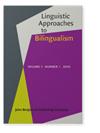为 L3 中的非同义词提供便利
IF 1.8
2区 文学
0 LANGUAGE & LINGUISTICS
引用次数: 0
摘要
在本研究中,我们的目标是通过三语者获得早先报道的认知抑制效应,即二语者在进行第二语言词汇决策任务(LDT)时,与非同源认知物和对照组的认知抑制效应。为此,波兰语-英语-荷兰语三语者在他们的第三语言中进行了两次LDT。在实验 1 中,刺激物包括波兰语-荷兰语(如 SMAK-SMAAK)和英语-荷兰语(如 BUTTER-BOTER)两种类型的双非同义词,以及匹配的非同义荷兰语对照(如 JASJE)。在实验 2 中,我们测试了波兰语、英语和荷兰语(如 GRUPA-GROUP-GROEP)之间的三重非相同同义词以及荷兰语对照组(如 BROEK)。我们未能发现双语抑制效应。相反,我们发现英语-荷兰语和波兰语-英语-荷兰语同源词有明显的促进作用,尽管没有使用相同的同源词。然而,波兰语-荷兰语同源词的结果为零。目前的研究结果强调了形式相似性水平对所观察到的同源物效应的影响,并指出刺激列表的组成在同源物加工中的重要作用。本文章由计算机程序翻译,如有差异,请以英文原文为准。
Facilitation for non-identical cognates in L3
In the present study we aimed to obtain with trilinguals the cognate inhibitory effects reported earlier for
bilingual speakers who performed L2 lexical decision tasks (LDTs) with non-identical cognates and controls. To that end,
Polish–English–Dutch trilinguals performed two LDTs in their L3. In Experiment 1, the stimuli included two types of double
non-identical cognates Polish–Dutch (e.g., SMAK–SMAAK), and English–Dutch (e.g., BUTTER–BOTER)
as well as matched non-cognate Dutch controls (e.g., JASJE). In Experiment 2, we tested triple non-identical
cognates shared across Polish, English and Dutch (e.g., GRUPA–GROUP–GROEP) and Dutch controls (e.g.,
BROEK). We failed to find the bilingual inhibitory effects. In contrast, significant facilitation for
English–Dutch and for Polish–English–Dutch cognates was found, even though no identical cognates were used. However, Polish–Dutch
cognates yielded null results. The current findings emphasize the influence of the levels of form similarity on the observed
cognate effects and point to the important role of stimulus list composition in cognate processing.
求助全文
通过发布文献求助,成功后即可免费获取论文全文。
去求助
来源期刊

Linguistic Approaches To Bilingualism
Social Sciences-Linguistics and Language
CiteScore
3.20
自引率
9.10%
发文量
24
期刊介绍:
LAB provides an outlet for cutting-edge, contemporary studies on bilingualism. LAB assumes a broad definition of bilingualism, including: adult L2 acquisition, simultaneous child bilingualism, child L2 acquisition, adult heritage speaker competence, L1 attrition in L2/Ln environments, and adult L3/Ln acquisition. LAB solicits high quality articles of original research assuming any cognitive science approach to understanding the mental representation of bilingual language competence and performance, including cognitive linguistics, emergentism/connectionism, generative theories, psycholinguistic and processing accounts, and covering typical and atypical populations.
 求助内容:
求助内容: 应助结果提醒方式:
应助结果提醒方式:


